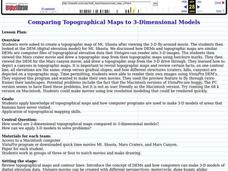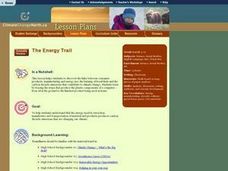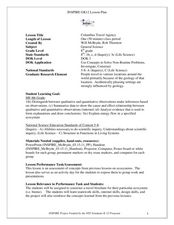Curated OER
Taking a Stand: Pros and Cons of Forest Fires
Students explore the pros and cons of forest fires. In this science lesson, students research the ecological implications of forest fires. Students record their findings in journals and compose a persuasive e-mail to government officials.
Curated OER
Robot Earth
Students construct a simple robotic energy transformer. In this space science lesson, students explain how energy is transformed from one form to another. They identify the different uses of robotic devices.
Curated OER
Comparing Topographical Maps to 3-Dimensional Models
High schoolers apply knowledge of topographical maps and how computer programs are used to make 3-D models of areas that humans have never visited. They view a Mars Canyon movie, then map the canyon.
Curated OER
Investigating the Biosphere With Planetary Models
Young scholars create a biosphere using the computer program SImEarth. They work in small groups to create "Daisyworld" in which they model aspects of the Gaia hypothesis. They form a question to answer and choose variables to...
Curated OER
Skin: Skin Prints
Learners explore human anatomy by participating in a print experiment. In this human skin instructional activity, students define the term "epidermis" and utilize computer paper, pencils, tape and baby wipes to create a print of their...
Curated OER
Animal Story: An Informational Narrative
Students use the computer to research information and publish creative narrative stories about the life of a specific Everglades animal. This instructional activity uses many educational, computer programs including the iLife suite,...
Curated OER
The Energy Trail
Learners examine the relationship between the products they use and energy use. Using the internet, they identify the role that manufacturing plays in using energy and the emissions that change the climate. They discover the steps to...
Curated OER
The Earth is Tilted, What Does that Mean?
Middle schoolers examine the tilt in the Earth's revolution around the sun. Using that information, they draw a picture and label the indirect and direct rays of the sun. In groups, they answer discussion questions and complete an...
Curated OER
Summer Camp in the Classroom
Students explore wildlife plants and summer activities. In this natural science lesson, students identify plants and animals and create a scrapbook of their findings.
Curated OER
How to weigh a tree
Learners pick a tree they see everyday. They measure the tree's circumference and estimate its height using similar triangles. Students are introduced to Computational Science. They use computers and calculators to compute values...
Curated OER
Scientific Scenes
Students discover how the public's perceptions of science have changed throughout recent history; then research scientific and technological breakthroughs in a variety of areas. They then create plays that allow scientists to encounter...
Curated OER
Over the Rainbow with Isaac Newton
Second graders study rainbows and do an interdisciplinary assignment that includes poetry and a science experiment.
Curated OER
Five Kingdoms of Living Things
Fifth graders are introduced to the classification system used in Science. In groups, they explain the characteristics of each of the five kingdoms. After watching a video, they review the life processes of each kingdom and complete a...
Curated OER
Lego Robot Competition
Young scholars are introduced the "Lego Robot Competition", demonstrate Lego Data Control System that is controlled through tethers by laptop computers. High School students create the competition, organize the media coverage, and...
Curated OER
What Is Your Explanation for the Evidence?
Students encounter an interactive computer program activity designed as a diagnostic of student beliefs related to the theory of evolution. Students process the Hypercard cascades structured around a set of biological topics related to...
Curated OER
Viewpoint on Causes of Global Warming - An Assignment Using Anonymous Electronic Peer Review With a Dropbox
Students are told that studies exist that suggest human activities are not causing warming of the Earth. Students are given the opportunity to further their writing, critical thinking and reasoning skills. While enhancing their computer...
Curated OER
Describe and Interpret Images: Folded Strata
High schoolers describe and interpret images. They make a simple sketch of an outcrop shown in a slide (or computer projection) then discuss possible interpretations.
Curated OER
Frog Habitats
Students are placed in pairs and given a type of frog to research on the computer. They research its habitat for 30 minutes on the computer and then make a 3-D habitat/model of their individual frogs living environment with their...
Curated OER
Onion Skins
Students explore the structure of a plant cell. They carefully peel a single layer of onion skin from a slice of onion and stain it with methylene blue to observe the structures inside. They use a Digiscope connected to a computer to...
Curated OER
The Water Cycle
Second graders use the program HyperStudio to draw and describe the water cycle. In this science and technology lesson plan, 2nd graders will first become familiar with the water cycle by exploring books and websites in the classroom....
Curated OER
Tree Trekkers
Students explore different types of trees. In this tree lesson, students use a digital camera to photograph trees in their area and upload them to a computer. Students will share their findings by using their photos to make a booklet or...
Curated OER
Water Lesson Plan
Young scholars discuss the importance of water in our daily lives. In this physics activity, students calculate the pressure of water tower systems. They investigate the effect of certain variables using a computer simulation.
Curated OER
Habitat for Plants! There's No Place Like Home!
Students compare and contrast conditions necessary for survival of aquatic and terrestrial plants, identify common and scientific names of plants,
and determine correlation between location and plant characteristics. Students then use...
Curated OER
Columbus Travel Agency
Eighth graders research about their chosen ecosystem. In this life science lesson, 8th graders play the role of travel agents and create a travel brochure. They share this in class.























